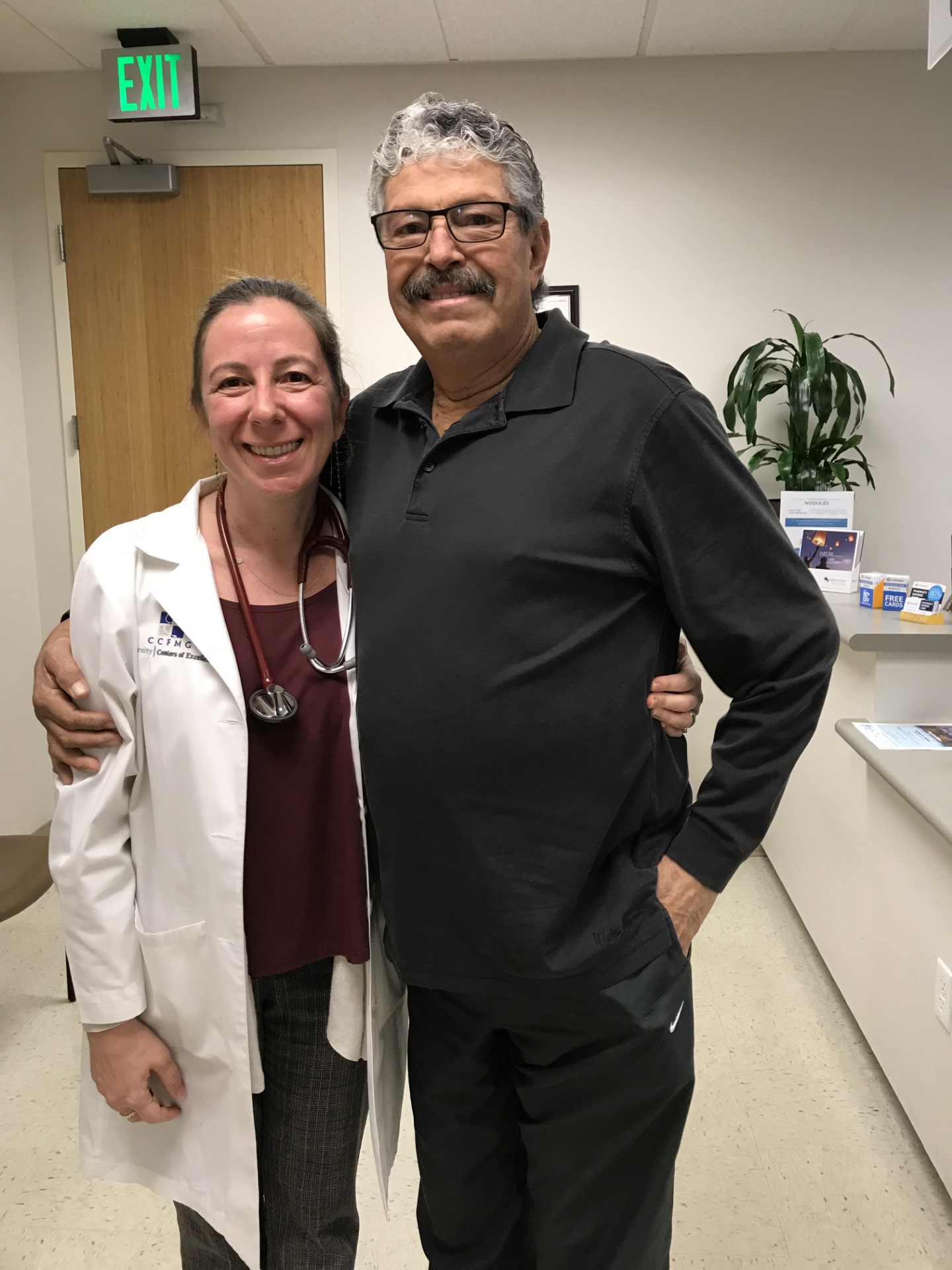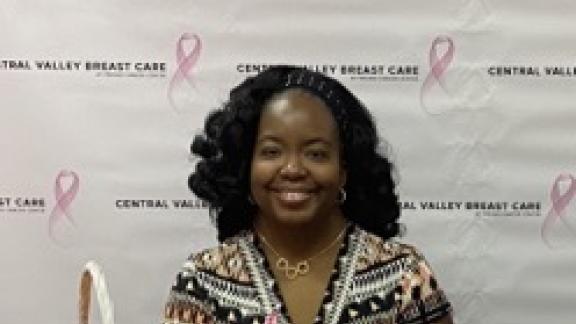
Rick Amparan had a badly scarred liver after decades of heavy drinking – and a grim prognosis of only three to six months to live – when he made an appointment four years ago to see Marina Roytman, MD, FACP, a UCSF Fresno liver diseases specialist and Liver Program director.
Dr. Roytman told Rick, 69, of Clovis, his liver would eventually stop working properly and he would need a transplant. But she could help him stay healthy for as long as possible and prepare for a transplant, if he followed these steps: maintain sobriety, regularly attend substance use meetings and have a support system, among other requirements.
She pushed him mentally, physically, and emotionally, but foremost she gave Rick hope. “She was a very positive person. She didn’t give up on me.”
Dr. Roytman remembers having a lot of “heart to hearts” with Rick about the importance of attending support group meetings. “That did not fully hit home for a while,” she says.
With the support of his wife, Debbie Rogers, Rick maintained his sobriety and met the criteria to be on a list for a liver transplant at UCSF in San Francisco. In December 2021, he received a donor liver.
His journey to sobriety was not easy, Rick says. He started drinking as a teenager and over many years the use of alcohol increased. “The alcoholism is a lot stronger than your mind. And it’s easy to just say, ‘tomorrow I’m going to slow down.’”
Alcohol misuse is a disease, Dr. Roytman says. “And we should approach it as a disease rather than a moral failure.” Rick is doing great, she says. “He’s committed to sobriety. He’s helping others in his situation. He is an amazing, amazing role model.”
Increasingly, she is sounding an alarm about alcohol use and liver disease. And her concern goes beyond patients like Rick whose chronic alcohol use led to cirrhosis of the liver. Since the COVID-19 pandemic, she is seeing younger patients in severe liver injury who have alcohol related hepatitis or severe inflammation of the liver. The condition develops much quicker and can be just as life-threatening as cirrhosis.
“Instead of literally years and decades of excessive drinking, we may see weeks or months of excessive drinking and instead of the liver being small and shrunken like in cirrhosis, we’re seeing massively enlarged and inflamed livers,” Dr. Roytman says. “This is the hallmark of alcohol related hepatitis.”
Cases of alcohol related hepatitis have skyrocketed since March 2020, the beginning of the pandemic. A UCSF Fresno study, led by Dr. Roytman, found a 51% increase in admissions for severe alcohol related hepatitis in 2020 as compared to 2019, and a 64% increase in 2021 as compared to 2019.
The study looked at patients seen at Community Regional Medical Center, Clovis Community Medical Center and Fresno Heart & Surgical Hospital.
Women and patients younger than 40 years of age are suffering the most from alcohol related hepatitis. In women, hospital admissions were up 129% in 2020 from 2019 and increased 179% in 2021 from the baseline. Similarly, patients younger than 40 years of age had a 100% increase in hospital admissions in 2020 and a 136% increase in 2021 from the 2019 baseline.
This year, Dr. Roytman and her team looked at a National Inpatient Sata sample of 800,000 patients and saw a massive increase from 2019 to 2020 in hospital admissions for alcohol related hepatitis with particularly startling increases for women and young patients.
Patients with alcohol related hepatitis sometimes recover slowly, but “the hardest thing is we really are not able to fully predict with 100% certainty who is going to recover and who is not going to recover,” she says. “Patients may die just as well from alcohol related hepatitis as they are from alcohol related cirrhosis – and sometimes even faster.”
She recalls at least a half a dozen patients in the first half of 2023 who were referred to transplant centers, but that is an underestimate of those in need. “These are the good candidates. They have good support systems; they understand they got into trouble with drinking; they are willing to engage in treatment; they have a car to get to the transplant center.”
Dr. Roytman gets asked why alcohol related hepatitis has increased since the start of the COVID-19 pandemic and its ensuing lockdowns and surges. “Our hypothesis is that COVID-19 created this perfect storm. Early in the pandemic we had a mental health crisis. People were terrified, people were depressed, people were anxious. There were shelter in place orders, which created easy access to alcohol as well as lack of distraction from consuming it,” she says. Additionally, the economy was taking a nosedive. People were losing their jobs, and some were losing their homes. “So, lots of stressors there.”
Now, more than three years into the pandemic, Dr. Roytman says alcohol related hepatitis cases remain high – perhaps driven now by the stresses associated with rising inflation, and more so by the habits of heavy alcohol consumption acquired during the pandemic years – and she is doing her best to increase awareness. “We really need a large public awareness campaign to recognize that this is a huge problem.”
Her prescription for individuals: “I really want us to remember how life was before the pandemic. Let’s go outside. Let’s have a picnic at the park. Let’s go back to the gym. Movie theaters are open. Let’s find other things that give us joy rather than focus on alcohol.”
She recognizes the stigma surrounding alcohol use disorder remains a roadblock to sobriety for many. “I feel it is more stigmatizing than smoking. So, we absolutely need that government public education campaign and I think we can find patients, like Rick, who could be our spokespeople.”
Rick and wife, Debbie, support Dr. Roytman’s efforts to educate the public about alcohol use disorder and health consequences. “He would not be here if it were not for her. We know that deep down inside,” Debbie says. “We know she is the one who helped me to help him believe that he had a chance.”
There’s no doubt Dr. Roytman saved his life, Rick says. Since his transplant, and his strength is returning, he freely expresses his gratitude at appointments. “She’s just been my angel,” he says tearfully. “She turned my life around. She really, really did. God, I’m just so thankful for that.”




